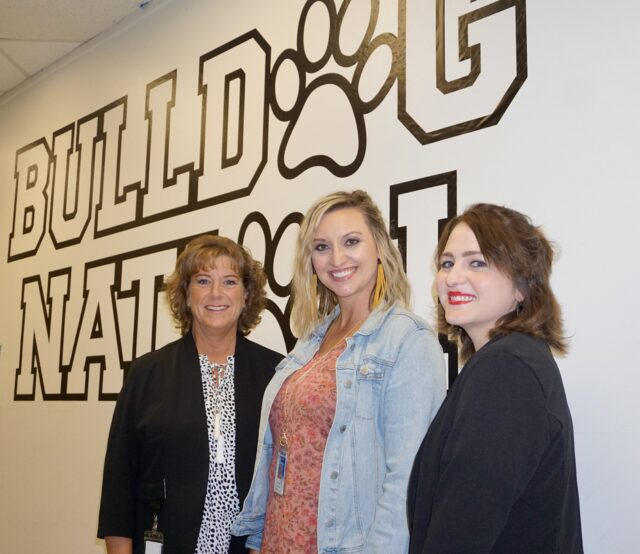Master Teachers Support All Teachers
September 14, 2022

Crockett High School master teachers Melissa Welch, Abbey Nucci and Katelyn Johnston
Recently, three master teachers from Crockett Independent School District (ISD) were featured in their local newspaper, The Messenger. Crockett ISD is part of a project with three other Texas districts to increase teacher and school leader effectiveness and improve teaching and learning. The federally-funded grant project, called Texas IMPACT, includes partnerships with the National Institute for Excellence in Teaching (NIET) and the Branch Alliance for Educator Diversity (BranchED).
The three Crockett ISD master teachers, Melissa Welch, Abbey Nucci, and Katelyn Johnston, reflect on their decision to move into teacher leadership roles and how these roles are allowing them to impact classroom instruction across the entire high school.
Crockett High School Master Teachers Teach The Teachers
By Greg Ritchie, The Messenger
The Crockett Independent School District (CISD) hired Master Teachers this year as part of a multiyear program to support classroom teachers. The National Institute for Excellence in Teaching (NIET) is a partner in the project, called Texas IMPACT.
Housed in a busy office in Crockett High School, three of the district’s new master teachers were hard at work when they took time to speak with the Messenger. The program is designed to enhance what teachers already do by evaluating both them and their students. Progress is logged and tracked and both teachers and master teachers must constantly adjust their teaching methods based on these evaluations as well as grades and test scores.
Katelyn Johnston is a Latexo graduate who has worked for several school districts – big and small – before returning home to Houston County. She was a teacher at CISD for three years before qualifying for the master teacher position this year.
Johnston said the master teacher program was designed to make great teachers better.
“Our role is to support teachers and maximize student achievement,” Johnston explained. “That includes a lot of different responsibilities throughout our day. We are each assigned a number of teachers to work with. Throughout the year, we work on their lessons and make observations of their classes. We look at how they are planning their lessons. We look at the classroom environments – basically how all of these elements are contributing to student achievement.
Abbey Nucci, one of the other two master teachers at Crockett High, worked in the Dallas area before becoming a technology teacher at Crockett Junior High before becoming part of the master teacher program. Her background is in both education and athletics.
“Great, I love it!” Nucci said of the new position. “I didn’t immediately jump on it because it was hard for me to leave the classroom. The whole reason I am a teacher at all is because of my students. I had to really understand how this role would impact the students before I decided to join the program. Ultimately, we grow teachers to grow students. We provide teachers opportunities to grow and not become complacent in the work they have been doing for years. I know that will affect students.”
The other master teacher in the trio is teaching veteran Melissa Welch. She has worked in teaching for 30 years in area school districts before returning to education this year as a master teacher. She said adapting to the new role was not easy.
“It was hard,” Welch said. “It was a hard decision to take this job because all I knew was being in the classroom teaching chemistry and other sciences. Here I have learned how I could have grown as a teacher. I see new ways that I could have implemented this program when I was in the classroom.”
Welch said getting teachers to buy into the new program benefits everyone.
“When teachers buy into this program, they really understand that we teach for the student. This program is 110% for the student to grow. Everything we have asked the teachers to do, they have stepped up to the plate and they are hitting it out of the ballpark. It’s all a learning process. We are lucky enough to have a Superintendent and Assistant Superintendent that were in the program. Our administrators on campus are learning along with us and with the faculty.”
“It’s not all about getting to the classroom and sitting in the classroom. Teachers get bored when people just stand and talk to us. If I would have known these lessons when I was teaching, I would have been maybe a little less rigid and had more open-mindedness about how I ran my class. We need more student-centered work.”
Johnston concluded that the team is working well, and that working in a smaller school district has helped build the team alongside teachers and students.
“You spend more time with the people at work than you do at home,” Johnston said. “So the people that you surround yourself with become like family to you. That familial element is naturally there. You can find that in bigger schools, but it doesn’t feel as genuine.”
This article is republished with permission from The Messenger, a news outlet serving Houston and Anderson Counties in Texas. To read the original story and see more photos, access the article here.